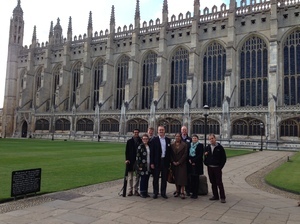Access, targeting, safety and quality of ACT drugs at malaria conference
31 March 2015

Delegates debated policy implications for the use of malaria rapid diagnostic tests (RDTs) in the public and private health sectors. ACT Consortium members presented research results at the annual retreat of the Malaria Centre from the London School of Hygiene & Tropical Medicine, in Cambridge, UK.
Improving access to and targeting of antimalarials was a key topic at the conference. Preliminary results on common patterns in malaria diagnosis and treatment across ACT Consortium studies were presented by statistician Baptiste Leurent, on behalf of the working group conducting cross-project analyses.
The aim of these analyses is to inform policy to better implement malaria rapid diagnostic tests and programme development for future RDT implementation. The coordinator of the cross-project work, Dr Heidi Hopkins, welcomes suggestions on how to make the final outputs most useful for relevant stakeholders in sub-Saharan Africa.
"A key marker of success for the ACT Consortium is when decision-makers in malaria-endemic areas can use these research results to guide policy and programme development for their malaria control efforts,” Dr Hopkins said. “We try to make our results accessible to a range of audiences, and are very interested to discuss how these results relate to other findings, and in different scenarios and settings."
Watch a 90 second video on malaria diagnosis and treatment
Private sector: an important player in malaria diagnosis
The cost-effectiveness of introducing RDTs in different settings, such as public health facilities and private drug shops, is another focus for Consortium health economists. David Bath presented a model, in development with collaborators, to assess the cost-effectiveness of introducing RDTs in private health care sectors, which remain an important source of treatment for patients with fever in malaria-endemic countries.
This model forms part of a wider effort to measure how cost-effective various interventions are in improving fever case management - including malaria fevers and non-malaria illnesses - to provide evidence for decision-making by National Malaria Control Programmes.
The study "Use of RDTs to improve malaria treatment in the community in Uganda" was represented by Sham Lal, who gave a presentation on how community health workers adhere to guidelines to refer severely ill children for further treatment, and whether those caring for them accept the referral advice.
Safety and quality of antimalarials
Assessing the safety of artemisinin-based combination therapies (ACT), the first-line treatment for malaria, is another research theme of the ACT Consortium. Cheryl Pace presented collaborative work to collate potential harms from these drugs in a centralised data repository at the Liverpool School of Tropical Medicine, which may be useful to other research groups in the future.
Concerns about fake medicines generated attention as Dr Harparkash Kaur presented reassuring results from the Consortium's drug quality project, which analysed over 10,000 antimalarial samples from six countries in Africa and Southeast Asia. Full results will be publicly available next month.
Ebola and malaria: fever as the common symptom
Guest speakers at this year’s Malaria Centre annual meeting included Dr Samuel Smith, who leads Sierra Leone’s National Malaria Control Programme, and Dr Maru Aregawi from the WHO Global Malaria Programme.
In his award-winning presentation on malaria control efforts during the Ebola outbreak in Sierra Leone, Dr Smith highlighted the importance of social mobilisation through mass media and community health workers in raising awareness about the difference between Ebola and malaria, despite their common early symptom - fever.
Dr Aregawi presented on the country’s implementation of mass drug administration for malaria in response to the Ebola outbreak. He also expressed interest in the results of the ACT Consortium cross-project analyses.
Further information
- If you are interested in receiving more information about any of the studies mentioned above, please e-mail heidi.hopkins@lshtm.ac.uk.
- Visit the London School of Hygiene & Tropical Medicine's Malaria Centre website
- Learn more about the ACT Consortium work on the access, targeting, quality and safety of ACTs

